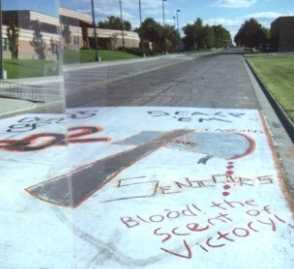Some postings answer the questions I get asked sometimes:
Tim Wise Takes On Critics of White Anti-RacistsWhy am I disseminating news and writing analyses rather than fighting for social justice in person? (
Rob Should Fight Poverty?!)
Tim Wise: As for the issue of organizing versus “lone cowboy”-ism, there are lots of different roles to play in the struggle against injustice. Organizing is one critical role. At one point, that is the work I did. For about the first five years after college. But I just wasn’t very good at it. I was OK, but it’s too important a job to have it done by someone who’s just OK. So I chose to move away from that work, because I wasn’t being of assistance to the community in the way the community deserved.
So as I was trying to figure out what I might be able to do to support the cause of social justice, I pretty quickly came to realize that my only two skills were writing and speaking. I’m a lousy fundraiser, a lousy administrator, awful with organizational details. So the question was, and is, how can I put these two skills to use? And what is the most accountable way to use the skills? And that’s a great question, which I know I haven’t figured out yet entirely. But to say that someone who plays this role (fundamentally as an educator) is a lone cowboy strikes me as odd. I mean, if I were a professor, I would be an educator. And I would write books, and articles, and potentially get attention in media too, but would people accuse me then of being a lone cowboy? Probably not. But what I do is not that different: I am an educator, it’s just that I don’t have a fixed classroom where I work three days a week. I have several “classrooms” so to speak, each week, where I speak to people about these matters.Am I "speaking for Natives" and preventing them from speaking for themselves? (
Whites Fighting Racism Is Racist?!,
Rob Unqualified to Discuss Stereotypes?!, etc.)
Now, as for the issue of how my work might be crowding out people of color, obviously, it’s possible that my voice, by way of being amplified—on campus, or in the media, etc.—might crowd out people of color doing the work. But there is also another possibility, and it’s what I hear from people of color is happening on the campuses and in the communities I visit. And that is, my voice appears to be helping whites in these places open up in classes taught by these people of color. Hearing me speak, or reading something of mine in the syllabus appears to make them more willing to engage respectfully with the professor of color, and the rest of the syllabus, most all of which is material written by folks of color. Now, on the one hand, this is incredibly fucked up, that it should take a white person to validate people of color in the eyes of white folks. But to the extent that’s a reality, we have to deal with it. So there are two ways of looking at the effect of whites in this work: as zero-sum, in which there’s a limited amount of space for antiracist writing, speaking, etc, and if whites get x, y, or z slot, there are fewer slots for black and brown folks, or as a generated demand thing, where if whites can get other whites thinking about these issues differently, we can stimulate demand for more speakers—mostly of color—and their writing as well.What's the point of education when so many problems need hands-on help? (
Educational Value of Blogging)
The cantankerous cureAustralian philosopher Simon Longstaff says we need to question everything to heal our sick institutions.
By Gregory RodriguezThis plays out in a variety of ways. Longstaff sees leaders of the Roman Catholic Church, an institution founded to spread the Gospel of Jesus—who taught that love is more important than institutions and their laws—responding to the sexual abuse scandal by putting its hierarchy and practices above love. He sees players in the financial markets, which were founded to facilitate transactions between parties in the real economy, forgetting their purpose and becoming more interested in making deals with one another. He sees professors at universities—institutions meant to introduce students to the wide world of learning—undermining that ideal by fragmenting knowledge into mutually unintelligible specializations. He sees the media falling away from its purpose of helping citizens to make informed decisions and becoming more interested in tripping up candidates and turning politics into a horse race.
And what does he suggest will get us out of this amnesic stupor? Dangerous ideas. Plausible yet discomfiting notions that force us to consciously ask why our institutions exist and what they should accomplish. He believes that we need to engage ideas that threaten us, threaten everything, in order to find out what we really believe and why.Comment: This is a good statement of my position. You can't begin to reform anything--politics, economics, culture--if you don't believe anything's wrong. So my goal is to encourage people to think critically. To look at America's mainstream beliefs and ideas from another perspective--a Native or
multicultural perspective. To question things we usually take for granted.
For more on the subject, see
William Means on Education and
Why Does Rob Keep Criticizing?Below: As one example,
Indian mascots continue
not because mascot lovers have superior arguments. They continue because most Americans haven't thought about them. Encouraging Americans to think about such issues is the first step toward addressing those issues.



"Below: As one example, Indian mascots continue not because mascot lovers have superior arguments. They continue because most Americans haven't thought about them."
ReplyDeleteI didn't mind them.... until I thought about them.